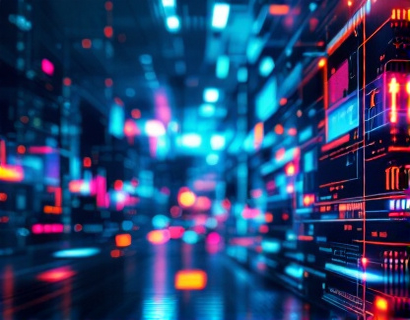Decentralized Productivity Revolution: Harnessing AI and Crypto for Next-Gen App Ecosystems
The digital landscape is undergoing a profound transformation, driven by the convergence of artificial intelligence (AI) and decentralized technologies. This revolution is not just about incremental improvements but a fundamental shift in how we design, interact with, and benefit from application ecosystems. For tech enthusiasts, professionals, and early adopters, understanding this shift is crucial to harnessing the full potential of the next generation of digital tools. This article delves into the transformative power of integrating AI and cryptocurrency into app ecosystems, exploring how these technologies are reshaping productivity and efficiency.
Understanding Decentralization in Technology
Decentralization, at its core, refers to the distribution of functions, processes, or assets away from a central authority. In the context of technology, this means moving from centralized servers and control to a network of nodes that collectively manage and operate systems. This shift brings several advantages, including enhanced security, increased resilience, and greater user control. Decentralized applications (dApps) leverage blockchain technology to ensure transparency, immutability, and decentralized governance, creating a more trustworthy and equitable digital environment.
AI: The Brain Behind the Revolution
Artificial intelligence, on the other hand, is the driving force behind the intelligence and adaptability of modern applications. AI technologies, including machine learning, natural language processing, and predictive analytics, enable apps to learn from data, adapt to new inputs, and perform tasks that traditionally required human intervention. When combined with decentralized technologies, AI can optimize processes, enhance user experiences, and create more intelligent and responsive app ecosystems.
Synergy of AI and Decentralization
The true power of integrating AI and decentralization lies in their synergistic effects. Decentralized networks provide the infrastructure for AI models to operate independently and collaboratively, without the bottlenecks and single points of failure associated with centralized systems. This synergy leads to more robust, scalable, and efficient applications. For instance, decentralized AI models can be trained using data from multiple sources, ensuring a more diverse and comprehensive learning experience. Additionally, the transparency and traceability of blockchain can help in verifying the integrity and performance of AI algorithms.
Enhanced Security and Privacy
One of the most significant benefits of combining AI and decentralization is the enhancement of security and privacy. Centralized systems are often targets for cyberattacks, as they represent a single point of vulnerability. Decentralized networks distribute data across multiple nodes, making it much harder for attackers to compromise the entire system. AI can further bolster security by detecting and mitigating threats in real-time, using advanced algorithms to identify anomalies and potential breaches. Moreover, blockchain's cryptographic techniques ensure that user data is encrypted and accessible only to authorized parties, providing a higher level of privacy and data protection.
Improved User Experience
The integration of AI and decentralization also leads to a more personalized and seamless user experience. AI-driven analytics can process vast amounts of user data to understand preferences, behaviors, and needs, allowing apps to tailor their services accordingly. Decentralized platforms can leverage this data to offer customized experiences without compromising user privacy, as data remains under the user's control. For example, a decentralized productivity app can use AI to analyze a user's workflow and suggest optimizations, all while ensuring that the user's data is securely managed and not exploited.
Decentralized Productivity Apps
The app ecosystem is witnessing a surge in decentralized productivity tools, designed to enhance efficiency and collaboration. These apps leverage blockchain to create transparent, tamper-proof workflows and decentralized AI to automate and optimize tasks. Here are some key areas where this integration is making a significant impact:
- Collaboration Tools: Decentralized collaboration platforms ensure that all participants have equal access and control over shared documents and projects. AI can facilitate real-time translation, content summarization, and task assignment, making cross-border and remote teamwork more effective.
- Project Management: AI-driven project management tools can predict project timelines, resource allocation, and potential bottlenecks. Decentralized governance models allow teams to make decisions transparently and democratically, ensuring accountability and fairness.
- Content Creation and Management: Decentralized content platforms use AI to curate, recommend, and monetize user-generated content. Creators can retain ownership and control over their work, while AI ensures that the content is relevant and engaging to the audience.
- Supply Chain and Logistics: Decentralized supply chain management systems use blockchain to track products from origin to destination, ensuring transparency and reducing fraud. AI can optimize routes, predict demand, and manage inventory, leading to more efficient and sustainable operations.
Case Studies and Real-World Applications
Several initiatives and platforms are already demonstrating the potential of decentralized AI-powered app ecosystems. For instance, a decentralized social media platform uses AI to moderate content and ensure user safety, while blockchain ensures that users own their data and can monetize their engagement. In the realm of finance, decentralized lending and trading platforms employ AI to assess creditworthiness and manage risks, all on a transparent and secure blockchain network.
Another notable example is a decentralized health record system that uses AI to analyze medical data and provide personalized health insights. Patients have full control over their data, and healthcare providers can access relevant information securely and efficiently. This not only improves patient care but also enhances the overall healthcare system's efficiency and reliability.
Challenges and Considerations
While the potential of decentralized AI-powered app ecosystems is immense, there are several challenges and considerations that need to be addressed. Scalability remains a significant issue, as blockchain networks can struggle to handle high transaction volumes. However, ongoing developments in blockchain technology, such as layer 2 solutions and sharding, are addressing these concerns. Additionally, the regulatory landscape for decentralized technologies is still evolving, and compliance will be crucial for widespread adoption.
Another important aspect is the user education and onboarding process. Decentralized technologies can be complex, and users need to understand the benefits and mechanics to fully leverage these tools. Providing intuitive interfaces and comprehensive documentation can help bridge this gap and foster broader ado



